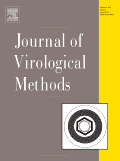
JOURNAL OF VIROLOGICAL METHODS
Scope & Guideline
Bridging gaps in virology through advanced research methods.
Introduction
Aims and Scopes
- Development of Diagnostic Methods:
The journal consistently publishes articles focused on the development and validation of various diagnostic methodologies, including PCR, ELISA, LAMP, and next-generation sequencing techniques for the detection of viral pathogens. - Viral Detection and Quantification:
A core area of interest is the quantification of viral loads in clinical and environmental samples, employing techniques like qPCR, digital PCR, and other molecular methods to assess viral presence and concentration. - Innovative Analytical Techniques:
The journal showcases research that employs novel analytical techniques, such as CRISPR-based diagnostics, nanopore sequencing, and high-throughput screening assays, aimed at enhancing the sensitivity and specificity of viral detection. - Viral Pathogenesis and Immunology:
Research articles often explore the mechanisms of viral pathogenesis and immune responses to infections, contributing to the understanding of disease processes and the development of therapeutic strategies. - Viral Characterization and Genomics:
There is a significant focus on the genomic characterization of viruses, including studies on viral evolution, strain differentiation, and the impact of genetic mutations on viral behavior and treatment efficacy. - Environmental Virology:
The journal includes studies on the detection and analysis of viruses in environmental samples, particularly related to wastewater surveillance and the implications for public health.
Trending and Emerging
- CRISPR and Gene Editing Technologies:
There is a notable increase in the use of CRISPR-based methodologies for viral detection and characterization, highlighting the technology's potential for precise diagnostics and therapeutic applications. - Environmental Surveillance for Viral Pathogens:
Research focusing on the detection of viruses in environmental samples, particularly wastewater, has gained momentum, reflecting growing public health concerns regarding zoonotic and waterborne viruses. - Multiplex and High-Throughput Assays:
The development of multiplex assays that allow simultaneous detection of multiple viruses is trending, catering to the need for efficient diagnostics, especially in the context of co-infections. - Viral Genomic Epidemiology:
Emerging interest in the genomic epidemiology of viruses, particularly in understanding mutations and variants, has increased, especially in light of the COVID-19 pandemic and ongoing viral outbreaks. - Point-of-Care Testing Innovations:
A rising trend in the journal is the development of point-of-care testing technologies, which aim to provide rapid and accessible viral diagnostics in clinical and field settings. - Vaccine Development and Immunogenicity Studies:
Research related to vaccine development, including the assessment of immunogenic responses to viral infections and the evaluation of vaccine candidates, is increasingly featured, driven by the urgency of global health challenges.
Declining or Waning
- Traditional Virus Culture Techniques:
Research focused purely on traditional virus culture methods has decreased, as the field shifts towards more rapid and sensitive molecular techniques for viral detection. - General Virology Studies:
There is a waning interest in broad, non-specific virology studies that do not employ innovative methodologies or focus on specific viral pathogens. The trend indicates a preference for targeted research that offers practical applications. - Non-Molecular Diagnostic Techniques:
The use of older non-molecular diagnostic methods, such as serological assays without accompanying molecular validation, has seen reduced emphasis, as newer, more efficient techniques gain traction.
Similar Journals

Frontiers in Virology
Disseminating Knowledge for a Healthier TomorrowFrontiers in Virology, published by FRONTIERS MEDIA SA, is an innovative open-access journal dedicated to advancing the understanding of viral biology, pathogenesis, surveillance, and control strategies. With the rapid evolution of viral threats, this journal serves as a critical platform for researchers, professionals, and students to disseminate and access high-quality research, reviews, and perspectives in virology. The journal places a strong emphasis on interdisciplinary approaches, promoting collaborative efforts that drive breakthroughs in the field. While the specific impact factor and H-index details are currently unavailable, Frontiers in Virology is committed to rigorous peer review and integrity in scientific publishing. Authors and readers will benefit from the extensive reach provided by open access, making groundbreaking insights available to a global audience, thus contributing significantly to the ongoing dialogue in virology and public health.
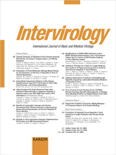
INTERVIROLOGY
Your gateway to cutting-edge virology discoveries.INTERVIROLOGY is a leading academic journal dedicated to advancing the field of virology and infectious diseases, published by KARGER. With a commendable history since its inception in 1973, the journal is currently poised to explore innovative virological research through to 2024. INTERVIROLOGY is indexed with the ISSN 0300-5526 and E-ISSN 1423-0100, reflecting its commitment to maintaining high scholarly standards. The journal is categorized within the Q3 quartile for both Infectious Diseases and Virology as of 2023, demonstrating its relevance and contribution to the academic community. With Scopus rankings placing it as #130 in Infectious Diseases and #41 in Virology, INTERVIROLOGY serves as an essential resource for researchers, professionals, and students seeking cutting-edge insights and discoveries in virology. While it currently operates under a subscription model, its rigorous peer-review process ensures a high quality of published content, making it a cornerstone for those dedicated to understanding and combating viral diseases.
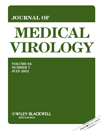
JOURNAL OF MEDICAL VIROLOGY
Elevating Research Standards: A Premier Source in Medical Virology.JOURNAL OF MEDICAL VIROLOGY is a prestigious academic publication dedicated to advancing the field of virology and infectious diseases. Published by WILEY, this journal has established itself as a cornerstone within the scientific community since its inception in 1977, and it will continue to provide cutting-edge research until 2024. With an impressive impact factor that places it in the Q1 quartile for both Infectious Diseases and Virology, the journal ranks 14 out of 344 in Medicine - Infectious Diseases and 6 out of 80 in Immunology and Microbiology - Virology according to Scopus metrics. Its focus encompasses a broad spectrum of topics, including viral pathogenesis, diagnostics, treatment strategies, and epidemiology, making it an essential resource for researchers, clinicians, and students alike. Although not an open-access journal, it provides valuable insights and accessible content for subscribers and libraries. The ongoing commitment to high-quality peer-reviewed articles makes JOURNAL OF MEDICAL VIROLOGY a vital platform for disseminating knowledge and fostering innovation in virology and related fields.

Retrovirology
Pioneering Discoveries in Virology and BeyondRetrovirology is a prominent open-access journal published by BMC since 2004, dedicated to the field of retroviral research. With a strong focus on advancing knowledge in both infectious diseases and virology, this interdisciplinary journal has achieved a commendable ranking of Q2 in its respective categories as of 2023, reflecting its significant contribution to the scientific community. Hosted in the United Kingdom, Retrovirology serves a global audience of researchers, professionals, and students, making vital research accessible to all without barriers. The journal's emphasis on high-quality peer-reviewed articles supports the dissemination of groundbreaking findings that could shape the future of virology and related fields. With an impressive Scopus ranking, including a percentile of 65th in Medicine: Infectious Diseases, it stands out as a valuable resource for those committed to understanding and combating viral diseases. Retrovirology continues to be an essential platform for innovative research, with its open-access model ensuring that transformational science reaches the widest possible audience.

Virus Evolution
Connecting researchers to the forefront of virus science.Virus Evolution is a premier open access journal published by Oxford University Press, dedicated to advancing the understanding of viral dynamics and evolutionary trends. Established in 2015, it has quickly ascended to a leading position in the fields of Microbiology and Virology, achieving a remarkable Q1 ranking in both categories for 2023. With its impactful research output, it ranks #27 out of 182 in Microbiology and #15 out of 80 in Virology, placing it in the top percentiles of the Scopus rankings. The journal serves as a vital resource for researchers, professionals, and students, providing a platform for the dissemination of innovative research that explores the genetic and ecological aspects of viruses. By embracing an open access model, Virus Evolution ensures that its high-quality content is accessible to a global audience, fostering collaboration and enhancing the impact of virology research worldwide.
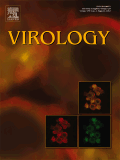
VIROLOGY
Exploring the Frontiers of Viral ScienceVirology, published by Academic Press Inc. Elsevier Science, is a prominent journal dedicated to advancing the knowledge and understanding of viral biology and pathogenesis since its inception in 1955. With a distinguished impact factor and recognized as a Q2 journal in the field of Virology for 2023, it ranks 38 out of 80 in the Scopus database for Immunology and Microbiology, placing it in the 53rd percentile among similar publications. This esteemed journal provides a platform for groundbreaking research, critical reviews, and comprehensive studies that contribute to our global understanding of viruses and their impact on health and disease. Although currently not an open-access journal, it remains accessible to a wide audience of researchers, professionals, and students who are keen to explore the latest advancements in virological research. The journal's scope encompasses a diverse range of topics, ensuring that it serves as an essential resource for anyone engaged in virology and related biomedical fields.

Food and Environmental Virology
Innovating Solutions for a Safer Food Supply and Sustainable EnvironmentFood and Environmental Virology is a distinguished journal published by SPRINGER, focusing on the intersection of virology, food science, and environmental health. With its ISSN 1867-0334 and E-ISSN 1867-0342, this journal stands out for its contributions to the understanding of viral pathogens affecting food safety and environmental sustainability. Operating from its esteemed location in New York, USA, the journal has made significant strides since its inception in 2009, with a converged publication period extending to 2024. It currently holds a commendable position within various categories, ranking Q3 in Epidemiology and Virology and Q2 in both Food Science and Health, Toxicology and Mutagenesis, indicating its crucial role in informing both research and policy in these fields. With impressive Scopus rankings—such as 82nd out of 389 in Food Science and 38th out of 148 in Epidemiology—Food and Environmental Virology continues to be a vital resource for researchers, professionals, and students committed to advancing knowledge and practices around food safety and public health. While it operates under a subscription model, the rigorous peer-review process ensures that only high-quality research is published, maintaining the journal’s integrity and relevance in the scientific community.

Advances in Virology
Connecting Researchers, Elevating VirologyAdvances in Virology, an esteemed journal published by HINDAWI LTD, serves as a pivotal platform for cutting-edge research in the field of virology and infectious diseases. With its ISSN 1687-8639 and E-ISSN 1687-8647, the journal has been a significant contributor to the scientific community since its initiation as an Open Access resource in 2009, allowing researchers from around the globe to access groundbreaking findings without barriers. Operating out of the United States and recognized for its commitment to high-quality research, the journal's relevance is underscored by its ranking in the Q3 category for Infectious Diseases and Q4 for Virology as of 2023. The time frame of publications spans from 2009 to 2024, reflecting a continuous commitment to exploring the evolving landscape of virology. This journal not only promotes the dissemination of novel insights and methodologies but also fosters collaboration and innovation within the scientific community, making it an invaluable resource for researchers, professionals, and students alike.
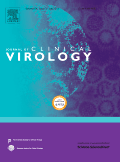
JOURNAL OF CLINICAL VIROLOGY
Empowering Clinical Insights into Viral DiseasesJournal of Clinical Virology, published by Elsevier, stands at the forefront of virology research, focusing on the clinical implications of viral diseases. With an impressive impact factor representative of its Q1 categorization in both Infectious Diseases and Virology, this journal is essential for researchers and healthcare professionals aiming to keep pace with evolving knowledge and treatments in virology. Since its inception in 1998, it has provided a vital platform for the dissemination of significant breakthroughs, now continuing through to 2024. The journal boasts competitive Scopus ranks, placing it in the 95th percentile for Infectious Diseases and the 91st percentile for Virology. Scholars can benefit from its selective Open Access options, promoting widespread access to cutting-edge research. With an ever-increasing demand for innovative solutions to viral infections, Journal of Clinical Virology remains dedicated to fostering advancements in the field, making it a key resource for anyone invested in virology and infectious disease management.

ANTIVIRAL RESEARCH
Advancing the Frontiers of Antiviral ScienceANTIVIRAL RESEARCH, published by Elsevier, stands at the forefront of the study of antiviral agents and therapy, with a dedicated focus on advancing the understanding of viral infections and their mechanisms. The journal is recognized within the top tier of academic publications, belonging to the prestigious Q1 category in both Pharmacology and Virology as of 2023, ranking 12th out of 313 in Pharmacology and 11th out of 80 in Virology according to Scopus metrics, reflecting its significant impact in the field. With a long-standing history since its inception in 1959, it continues to serve as an essential platform for researchers and health professionals alike, sharing critical findings that drive innovation in antiviral therapeutics. Although it does not currently offer open access options, the journal’s rigorous peer-review process ensures that every published article meets high academic standards, providing invaluable insights for those dedicated to enhancing public health through virology research.